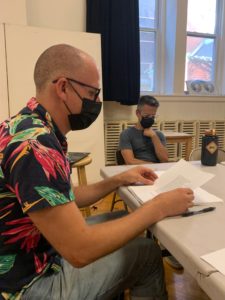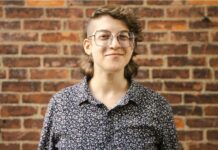
It makes perfect sense, if you don’t think too hard about it, that the son of a part-time clown would go on to write a play about a magic rock.
For Philadelphia-born Jewish playwright Dan Kitrosser, growing up playing Monsier Dumb Bobo — the assistant to his father Juggles the Clown and brother Noodles in the family “Bagel and Cream Cheese Circus” — laid the groundwork for the need to pretend.
Playing make-believe in his Mt. Airy home eventually evolved into Kitrosser, 38, becoming a full-time playwright, making a career in New York and Portland, Oregon, and returning to Philadelphia with his husband this past spring.
Kitrosser’s newest play and Philadelphia homecoming, “Hannah + The Healing Stone,” showing Aug. 18-28 at The Drake, aims to capture the whimsy of his childhood theatrical roots while grappling with what it means to be human in relationship with others today. The play is presented by the terraNOVA Collective.
Set in a fictionalized Jenkintown, “Hannah + The Healing Stone” begins with a Martin’s Aquarium employee who is asked to deliver a goldfish to an old “puttering” shut-in. The man stumbles across a stone with magical properties: If you hold onto it, think hard about what upsets you and let the stone go, you will be healed.
Only the man, holding onto grief, pain and toxic masculinity, refuses to let go of the stone.
Meanwhile, the old putterer turns into a goldfish with the ability to grant wishes; a film crew comes to Jenkintown to shoot a film; and the town begins to flood, with resident Hannah, “the girl who always wanted to leave town but couldn’t,” the only person able to set things right.
The play, overflowing with absurdity, has unconventional origins, but it is ultimately rooted in today’s zeitgeist.
In 2019, Kitrosser’s husband Jordan Siegel (who also plays the neurotic film director in the show), rattled off five random objects to Kitrosser, who needed an idea for the opening scene of a play.
“That’s kind of why the play kind of lives in a Jungian, dreamlike state because I was just sort of doing some automatic writing,” Kitrosser said. “So it was almost like an exercise that turned into a play.”
For most of the play’s early existence, it did not have a proper ending, dropping off at the end with an unsatisfying conclusion.
After the pandemic began, Kitrosser changed the ending. The real-life story about the importance of community in sustaining one another, even in times of grief and uncertainty, suddenly meshed with the fictional story about the reluctance to let go of pain and grief for fear of a similar uncertainty.
“Without the pandemic, I would not have had the space and the understanding of what this play was teaching me,” Kitrosser said.

It’s befitting that “Hannah + The Healing Stone” is making an extended appearance — having debuted in Portland last year — in Kitrosser’s hometown, with heavy creative input from his husband Siegel and longtime collaborator and director Kyle Metzger.
Creating strong emotional themes in the show was only one challenge of the show; creating a dynamic set in which the characters live was another. Metzger, who met Kitrosser during their early careers in New York, was tasked with representing a flooding town and bringing a goldfish to life. “Hannah + The Healing Stone” incorporates puppetry, dioramic sets, screens and a rich soundscape to immerse the audience into a waterlogged and magical Jenkintown.
The show’s visual effects also have the pandemic to thank, with Zoom theater creating innovative ways to incorporate technology into productions.
“The live video component and the projection is very much an effort to bring in some of the tools and the toys that we created during the pandemic era from digital theater back onto the stage,” Metzger said.
But “Hannah + The Healing Stone” hits close to Kitrosser’s self-proclaimed “very gay and very Jewish” roots.
Kitrosser attended Solomon Schechter Day School and Akiba Hebrew Academy and grew up indoctrinated into Jewish comedy by his father, who put on old recordings of Borscht Belt comedians.
Though many of the characters in the show are queer, Kitrosser adds his Judaism into the show more judiciously.
“Hannah + The Healing Stone” captures the same frenetic, anxious energy common in Jewish life and common in the traits of Kitrosser’s own family. It’s his own experiences, upbringing and personal touch that breathes life into the show.
“The great thing about Jewish comedy is that it lives right on the edge of danger, right on the edge of, ‘If we don’t do this, it will all fall apart,’” Kitrosser said. “Even though [the play] is not about yeshiva, it’s Jewish.”





